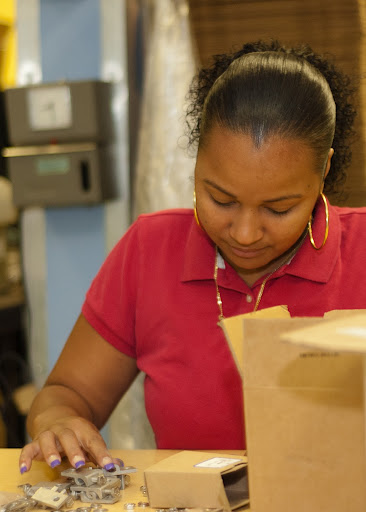


Contract Service work for people with disabilities may expand if trends for hiring temps continues nationwide. (Photo by Paige Connors, American Training, Inc.)
News from earlier this month that temporary and contract employment is on the rise has triggered reporters across the country to check in with agencies that hire workers to fill jobs; painting an overall picture where full-time work may not be returning anytime soon.
Traditionally, a spike in temp jobs is a sign of economic recovery that subsequently leads to businesses converting these contracted workers into employees. But Yuki Noguchi of Southern California Public Radio filed a July 26 report entitled, “For temp workers, ‘temp’ looking more permanent,” which notes that this is not the case with current increase in activity seen in staffing agencies. What’s more, the types of positions being filled by temps are increasing in scope. While speaking with Joanie Ruge, senior vice president of the employment agency, Randstad Holding, Noguchi writes:
Historically, temp positions have also been associated with clerical and manufacturing jobs. But that’s also shifting in the current economy. One of the biggest growth areas in temping, Ruge says, is high-skilled work: engineering, information technology, pharmaceuticals, accounting and finance. And employers are even hiring temps for jobs in the higher ranks. Ruge says professional positions make up about half of Randstad’s business.
Stories from The Examiner’s employment reporter Robin Johnson and Sean Driscoll of the Rockford Register Star point to similar outlooks on the current jobs landscape in Minnesota, Illinois, and Wisconsin; citing confidence in consumer demand for the goods being produced as the determining factor whether a business takes the leap toward hiring permanent workers.
The reality of temp work is nothing new for people with disabilities; without agencies that provide contract services to area businesses, many of them would never have the opportunity to prove they are productive, reliable employees. Reporter Stacy Jones spoke to several agencies in northern New Jersey for this Sunday article in The Star-Ledger, all of whom confirmed that they are taking on more contract services employees; but that the hope still is to combine the work experience gained there with career training services in order to help transition individuals with disabilities into full-time jobs.
Businesses with large-scale production projects won’t find better workforces available than those provided by these teams of individuals with disabilities. Their experience with manual labor tasks like assembly, sorting, and packaging has time and again generated satisfactory results. A recent story in the Rankin Ledger by Nell Luter Floyd illustrates the value brought by one organization to eateries in northwest Alabama’s Rankin County, both in volume of takeout utensil packages and their level of customization:
The 72 individuals who work at Hudspeth Industries assemble an average of 8,900 to 12,500 of the packets each month…Each restaurant chooses for its packets the color of plastic utensils — black or white — and either dispenser napkins or heavier dinner napkins… A packet may be customized to contain a peppermint, an individual sauce packet and perhaps a napkin with a restaurant’s logo…
If contract labor is to continue to be an increasing part of the new economic landscape, hopefully the job experiences of people with disabilities will give them an opportunity to play a larger role in the workforce.
Comments?